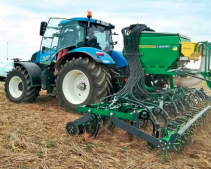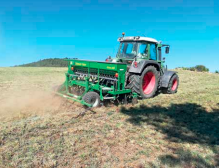A LIVING SOIL – THE KEY TO A SUSTAINABLE FUTUREMANAGEMENT

Simtech Aitchison has become a major player on the UK direct-drilling scene in recent years, producing a variety of machines all based on the Inverted T-Slot principle. They cover the broadest range of direct-drills on the market, encompassing arable, mixed, upland and lowland pasture and forage crops, to narrow drills for sowing cover crops in vineyards, walnut groves and orchards.
Simtech’s direct sales policy means that they are in constant contact with progressive and innovative farmers and producers, focussed on improving and experimenting with their cropestablishment and production methods. This gives the sales team a rich and varied insight into how sustainable agricultural systems are evolving into the future, which they in turn use to help customers get the best out of their purchase. “No-Till is not an adequate term for what we are looking to achieve” says Simtech’s Simon Clarke.
“Conservation Agriculture embraces the broader concept much better. Direct-drilling is a vital part of this equation, but needs to be allied with a diverse rotation, good residue management and optimum cover crop usage, to reach its full potential.” “It’s important to think of the soil as a living system and not a growing medium. Given the right tools, a living soil is capable of looking after itself and providing most, if not all, of the nutrients a crop needs. Cultivation disrupts the soil’s biology as well as its structure – tillage is detrimental to worm, mycorrhizal fungi and predator beetle activity, to name just three.”

“Cover crops do just what they say, along with the crop residue they cover the soil to protect it, feed worms and suppress weeds. A living soil can also hold onto much more water, therefore keeping crops growing for longer in times of drought. But of all the elements to building a healthier soil it is the Mycorrhizal Fungi that is the key. Hidden from view it is the web that drives all soil biology and responsible for making available nutrients that were previously unavailable to plants, producing proteins that are essential building healthy soil and protecting plants against pests and diseases.” Simon Clarke continues, “So the benefits are real and the savings on inputs can be massive. As we are presently moving into uncertain times and the near certain loss of main stream subsidies, adopting a more sustainable approach could mean the difference between profit and loss. Around the world, early adopters of Conservation Agriculture have seen their productivity and profitability soar, so this is a real thing and not a theory. It takes effort and commitment, but nothing is easy.”

Simtech continue to develop their machines to work in the environments seen in Conservation Agriculture, from drilling cover crops into often hard dry conditions directly after harvesting, late autumn drilling, when the soil can be quite wet, through to the spring drilling of cash crops into those same cover crops. With new trailed models planned for 2019 they are looking to offer the larger farmers the same capabilities that their core smaller and medium size customers have enjoyed for many years. Simtech have also been designing in extra versatility with a range of systems to allow one, two or even three extra products to be accurately applied at the same time as drilling.
Drills are available with one or two Stocks Rotor Meters for slug pellets and low dose fertiliser, which can both be metered into the airflow with the seed. A Stocks Turbo Jet can also be specified for slug pellets, fertiliser or seed for companion cropping in Oil Seed Rape. Simon Clarke says, “In 2018 we also developed a new model of our popular 300 and 300A Box Hopper drills. Called the T-Sem 300 Micro it has an additional 150 litre capacity “Micro Hopper”, which uses the same sponge feed metering as the main hopper and is capable of introducing slug pellets, seed or micro fertiliser into the seed slot. This makes for a very low cost, but incredibly versatile drill for smaller farmers or someone just starting out with direct drilling.” Liquid fertiliser is also now available across the range, with front mounted tanks up to 1800 litres and a choice of control systems including ISOBUS compatibility. To sum up Simon says, “Our whole philosophy is versatility combined with simplicity. We feel farmers need a crop establishment system that puts as few constraints on them as possible and many of our customers report that owning a T-Sem opens up new possibilities they had previously not thought possible.”
